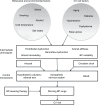Morning blood pressure surge: pathophysiology, clinical relevance and therapeutic aspects
- PMID: 29872338
- PMCID: PMC5973439
- DOI: 10.2147/IBPC.S130277
Morning blood pressure surge: pathophysiology, clinical relevance and therapeutic aspects
Abstract
Morning hours are the period of the day characterized by the highest incidence of major cardiovascular events including myocardial infarction, sudden death or stroke. They are also characterized by important neurohormonal changes, in particular, the activation of sympathetic nervous system which usually leads to a rapid increase in blood pressure (BP), known as morning blood pressure surge (MBPS). It was hypothesized that excessive MBPS may be causally involved in the pathogenesis of cardiovascular events occurring in the morning by inducing hemodynamic stress. A number of studies support an independent relationship of MBPS with organ damage, cerebrovascular complications and mortality, although some heterogeneity exists in the available evidence. This may be due to ethnic differences, methodological issues and the confounding relationship of MBPS with other features of 24-hour BP profile, such as nocturnal dipping or BP variability. Several studies are also available dealing with treatment effects on MBPS and indicating the importance of long-acting antihypertensive drugs in this regard. This paper provides an overview of pathophysiologic, methodological, prognostic and therapeutic aspects related to MBPS.
Keywords: ambulatory blood pressure monitoring; blood pressure variability; cardiovascular risk; morning blood pressure surge.
Conflict of interest statement
Disclosure The authors report no conflicts of interest in this work.
Figures


References
-
- Whelton PK, Carey RM, Aronow WS, et al. ACC/AHA/AAPA/ABC/ACPM/AGS/APhA/ASH/ASPC/NMA/PCNA guideline for the prevention, detection, evaluation, and management of high blood pressure in adults: a report of the american college of cardiology/american heart association task force on clinical Pr. J Am Coll Cardiol. 2017 2017 Nov;:13. Epub. - PubMed
-
- Mancia G, Fagard R, Narkiewicz K, et al. 2013 ESH/ESC guidelines for the management of arterial hypertension. J Hypertens. 2013;31:1281–1357. - PubMed
-
- Muller JE. Circadian variation in cardiovascular events. Am J Hypertens. 1999;12:35S–42S. - PubMed
-
- Wang J-G, Kario K, Park J-B, Chen C-H. Morning blood pressure monitoring in the management of hypertension. J Hypertens. 2017;35:1554–1563. - PubMed
-
- Kuwajima I, Mitani K, Miyao M, Suzuki Y, Kuramoto K, Ozawa T. Cardiac implications of the morning surge in blood pressure in elderly hypertensive patients: relation to arising time. Am J Hypertens. 1995;8:29–33. - PubMed
Publication types
LinkOut - more resources
Full Text Sources
Other Literature Sources
Medical

